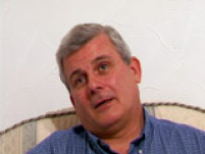Interview 27

Testicular cancer (seminoma) diagnosed in 2001; orchidectomy. No secondary tumours but 8 treatments of radiotherapy to prevent recurrence.
Postal worker; married, 2 adult children.
More about me...
Recalls it was hard telling his wife and children about the cancer and asserts that it was devastating for them.
Recalls it was hard telling his wife and children about the cancer and asserts that it was devastating for them.
Well I got them all together, I got them all together and that was my wife and also the two children, they were there. With getting them together it was the best way of telling them what was up rather than telling them individually. There's no easy way of telling them, it's just where you've got to say what you've got. It was devastating more for them than what it was for me, I think they were going through worse than what I was going through but when you rally round together, you're strong, you're a team then and the positive side comes in straight away. You've got to kick in on that or else you don't get through it. But that is the hardest part I think you know as regards telling your family, as regards what you have got in the first place and what you've got to go through and they've got to go through it with you. So it's still harder for them what it is for yourself.
Says that he has heard that cancer may be caused by the food we eat.
Says that he has heard that cancer may be caused by the food we eat.
Have you changed the way you eat at all?
I tried, I've tried. I've cut out a lot of the fatty things, yeah. I mean I think basically a lot of people eat too much fatty things don't they? But same as drinking and that like I don't even bother drinking now much, I just have the odd one now and again and enjoy it.
Recalls that he wanted information but that the doctors appeared too busy to talk to him.
Recalls that he wanted information but that the doctors appeared too busy to talk to him.
Was it hard to find a doctor to ask questions?
It was really yeah to answer them [questions], if you wanted them being answered, and that's why I went to the book side. I thought well if I get the book, the book will tell me everything.
So did you see the book before you had the surgery?
That was after, that was after. I was trying to get everything I could. As I say I had the leaflets, the leaflets they helped me but I wasn't getting everything out of them leaflets as what I should have done I didn't think.
Did you not get a chance to ask questions of a doctor in the hospital?
I did but they were busy, they were busy and I could understand that as well like you know. I was trying to ask them, you know, but all I got about the feedback was, "I'll come back to you." Well it was never, that coming back they didn't come back because they were that busy to come back to me. So I had the nurses there all the time like but like I say they didn't know enough about it to tell me like you know.
Explains how he was able to claim State benefits.
Explains how he was able to claim State benefits.
Bound to be, with everybody there's always bound to be an implication as regards money factors like. But nothing really bad, not drastic. My wife has been working. You always pull through no matter what, you just cut your cloth. I mean if, if it meant getting rid of things like a car and all that caper you get rid, if it means surviving do it.
So I mean you said you'd just left one job so you weren't still employed and getting money from them?
That's right, that's right. I was, you see I didn't even know that I'd got testicular cancer at the time, it was a job that I left to go to another one.
Were you able to claim sickness benefit? I'm not quite sure how it works.
Yes well what it is like at first I think it's 6 month you're allowed the benefits which is '53.10 a week. After that if you are unfortunate to still be poorly after that your money goes up. But I didn't go through all that because I was back to work after the 6 months like.
Right so what do they call that benefit, is that called Sickness Benefit?
It's er Income Support I think it was if I remember rightly so yeah.
Yes.
If you go along to your social like you know, no matter where you are, they will explain everything to you. After I come off that if I remember rightly so, while I was waiting for my job I signed on, on the dole. Being on the dole it was the same money as the Income Support. But like I say I wasn't, I wasn't actually out of work that long to experience a great deal of hardship because I'm back at work now like. But if I can, if I could help everybody out there I would.
Do you have to take certificates from the doctor to say you were sick, to get the '53 a week?
Yes, you still need a note, you still need a note.

